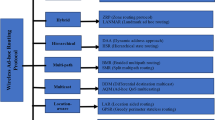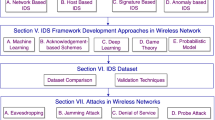Abstract
A Mobile ad hoc network (MANET) is a wireless, self-configuring network, dynamic in nature and works without any topology. Due to its widespread usage in many heterogeneous networks like Internet of Things (IoT) and the requirement for communication with heterogeneous devices, MANET is receiving more attention. Important data is gathered using smart devices or IoT sensors. These sensors communicate with one another independently within the range. Their energy levels and computing resources are restricted and they migrate frequently as topology is quiet active. Due to the energy constraints, nodes in the network behave selfishly and drop the packets during communication. Identification of the trustworthy and energy efficient nodes is essential for ensuring secure data transmission. The proposed method Energy Trust-Based Approach (ETA) combines trust, energy and reliable routing. Based on trust and energy values, nodes are involved in routing. This method identifies trusted nodes based on direct, indirect, past experiences and estimates their energy levels such that routing is performed only with the trusted nodes whose residual energy exceeds the determined threshold. Efficiency of the routing can be enhanced by calculating the energy levels of the trust adopted nodes in the network. The proposed ETA method ensures efficient routing between source and destination with the involvement of trustworthy and energy efficient intermediate nodes. The proposed work is simulated using Network Simulator (NS-2) and compared with other approaches, Trusted Energy Secured Ad hoc On Demand Vector scheme (TES-AODV), Secure Trust along with Adaptive Trust Threshold Method (STAT) and Ad hoc on demand vector routing (AODV). The simulation results have shown efficiency over the performance metrics like Packet delivery ratio PDLR with an increase of 5.34%, 4% decrease in Packet drop ratio PDR, 8% improvement in Throughput, 9% improvement in Residual energy, 8% reduction in Latency, 1.4% reduction in Overhead, 1,4 h increment in Network lifetime and 9% decrease in Delay. Thus ETA ensures stable, secured and trusted data transmission compared to simple AODV, STAT and TES-AODV.














Similar content being viewed by others
References
Singh S, Pise A, Alfarraj O, Tolba A, Yoon B (2022) A cryptographic approach to prevent network incursion for enhancement of QoS in sustainable smart city using MANET. Sustain Cities Soc 1(79):103483
Borkar GM, Mahajan AR (2017) A secure and trust based on-demand multipath routing scheme for self-organized mobile ad-hoc networks. Wireless Netw 23(8):2455–2472. https://doi.org/10.1007/s11276-016-1287-y
Acarali D, Rajarajan M, Komninos N, Zarpelão BB (2019) Modelling the spread of botnet malware in IoT-based wireless sensor networks. Secur Commun Netw 3:2019. https://doi.org/10.1155/2019/3745619
Alsaqour R (2021) A Simulation modeling approach for the performance of proactive, reactive and position-based routing protocols in MANET. Int J Comput Sci Netw Secur. 21(12):391–398
Shajin FH, Rajesh P (2020) Trusted secure geographic routing protocol: outsider attack detection in mobile ad hoc networks by adopting trusted secure geographic routing protocol. Int J Pervasive Comput Commun. https://doi.org/10.1108/IJPCC-09-2020-0136
Sarma HK, Mall R, Kar A (2015) E 2 R 2: Energy-efficient and reliable routing for mobile wireless sensor networks. IEEE Syst J 10(2):604–616. https://doi.org/10.1109/JSYST.2015.2410592
Sathiyavathi V, Reshma R, Saleema Parvin SB, SaiRamesh L, Ayyasamy A (2019) Dynamic trust based secure multipath routing for mobile ad-hoc networks. In: Balaji S, Rocha Á, Chung Y-N (eds) Intelligent Communication Technologies and Virtual Mobile Networks. Springer, Cham, pp 618–625
Mukhedkar MM, Kolekar U (2019) Trust-based secure routing in mobile ad hoc network using hybrid optimization algorithm. Comput J 62(10):1528–1545. https://doi.org/10.1093/comjnl/bxz061
Fatima SK et al (2017) Trust enhanced dynamic routing for MANET. Int J Adv Res Eng Technol. 8(3):25–36
Mandhare A, Kadam S (2019) Performance analysis of trust-based routing protocol for MANET. Computing communication and signal processing. Springer, Singapore, pp 389–397
Zhang DG, Gao JX, Liu XH, Zhang T, Zhao DX (2019) Novel approach of distributed & adaptive trust metrics for MANET. Wireless Netw 25(6):3587–3603. https://doi.org/10.1007/s11276-019-01955-2
Wadhwani GK, Khatri SK, Mutto SK (2020) Trust framework for attack resilience in MANET using AODV. J Discrete Math Sci Cryptogr 23(1):209–220. https://doi.org/10.1080/09720529.2020.1721885
Rajeswari AR, Kulothungan K, Ganapathy S, Kannan A (2021) Trusted energy aware cluster based routing using fuzzy logic for WSN in IoT. J Intell Fuzzy Syst 40(5):9197–9211
Pandey P, Singh R (2022) Efficient ad hoc on demand distance vector routing protocol based on route stability in MANETs. Int J Wirel Inf Netw 13:1–2. https://doi.org/10.1007/s10776-022-00570-x
Tan CW, Bose SK (2005) Investigating power aware AODV for efficient power routing in MANETs. In: 5th International Conference on Information Communications & Signal Processing. IEEE. pp 584–588
Sirajuddin M et al (2021) TBSMR: a trust-based secure multipath routing protocol for enhancing the QoS of the mobile ad hoc network. Secur Commun Netw. https://doi.org/10.1155/2021/5521713
Alnumay W, Ghosh U, Chatterjee P (2019) A trust-based predictive model for mobile ad hoc network in internet of things. Sensors 19(6):1467. https://doi.org/10.3390/s19061467
Reddy M, Srinivas PV, Mohan MC (2022) Enhancing the routing security through node trustworthiness using secure trust based approach in mobile Ad Hoc networks. Int J Inter Mobile Technol. 15:1613–1623
Reddy MV, Srinivas PV, Mohan MC (2022) Assessing node trustworthiness through adaptive trust threshold for secure routing in mobile Ad Hoc networks. Int J Adv Comput Sci Appl. https://doi.org/10.14569/IJACSA.2022.0130426
Sridhar S, Baskaran R, Anitha R, Sankar R (2017) Proficient and secured routing in MANET based on trust and energy supported AODV. Appl Math 11(3):807–817
Ragesh GK, Kumar A (2022) Trust-based secure routing and message delivery protocol for signal processing attacks in IoT applications. The J Supercomput 26:1–28
Syed SA, Shahzad A (2022) Enhanced dynamic source routing for verifying trust in mobile ad hoc network for secure routing. Int J Electri Comput Eng 12(1):425. https://doi.org/10.11591/ijece.v12i1.pp425-430
Author information
Authors and Affiliations
Contributions
MVKR has involved in writing the article and providing the results. PVSS contributed in analysing the data. MCM involved in generating the figures, tables and graphs.
Corresponding author
Ethics declarations
Conflict of interest
On behalf of all authors, the corresponding author states that there is no conflict of interest. The authors declare that they have no conflict of interest.
Ethical approval
This article does not contain any studies with human participants or animals performed by any of the authors.
Consent to participate
I have read and I understand the provided information.
Consent to publication
This article does not contain any Image or video to get permission.
Additional information
Publisher's Note
Springer Nature remains neutral with regard to jurisdictional claims in published maps and institutional affiliations.
Rights and permissions
Springer Nature or its licensor (e.g. a society or other partner) holds exclusive rights to this article under a publishing agreement with the author(s) or other rightsholder(s); author self-archiving of the accepted manuscript version of this article is solely governed by the terms of such publishing agreement and applicable law.
About this article
Cite this article
Reddy, M.K., Srinivas, P.V.S. & Mohan, M.C. Energy efficient routing with secure and adaptive trust threshold approach in mobile ad hoc networks. J Supercomput 79, 13519–13544 (2023). https://doi.org/10.1007/s11227-023-05187-2
Accepted:
Published:
Issue Date:
DOI: https://doi.org/10.1007/s11227-023-05187-2




